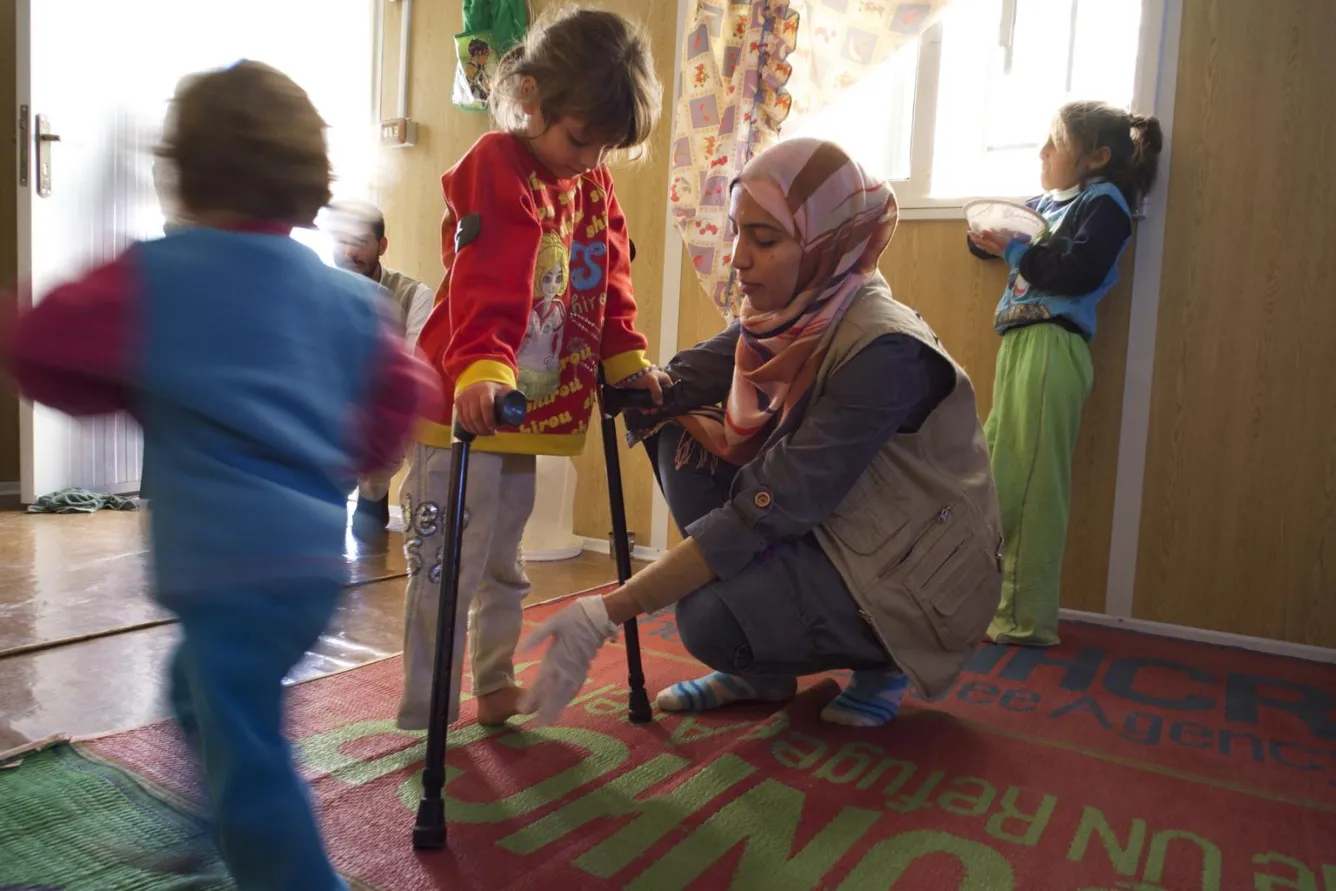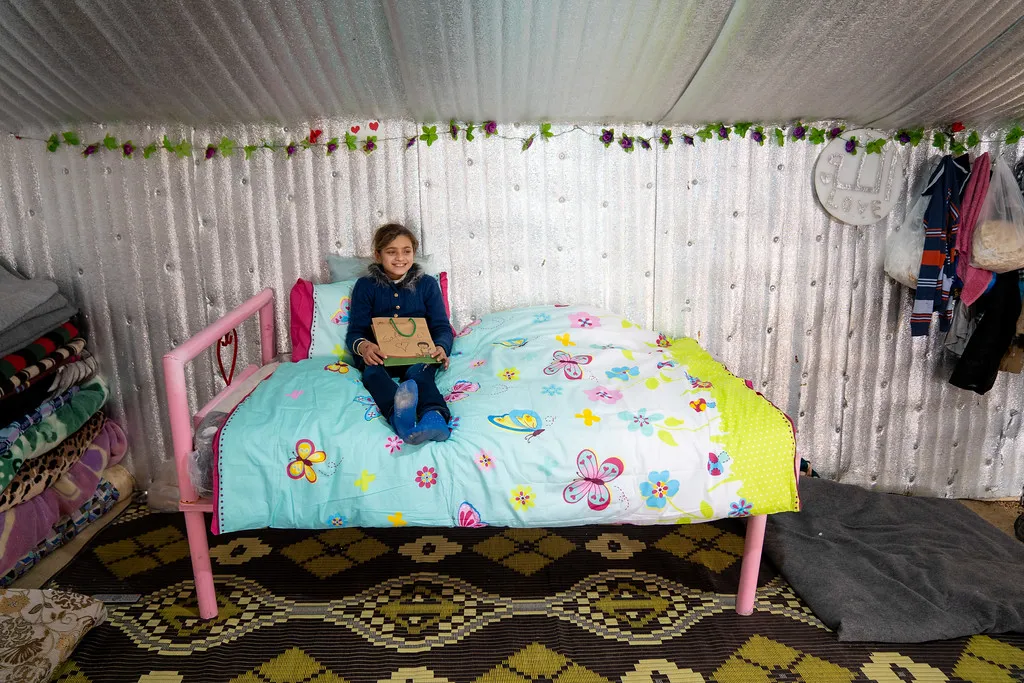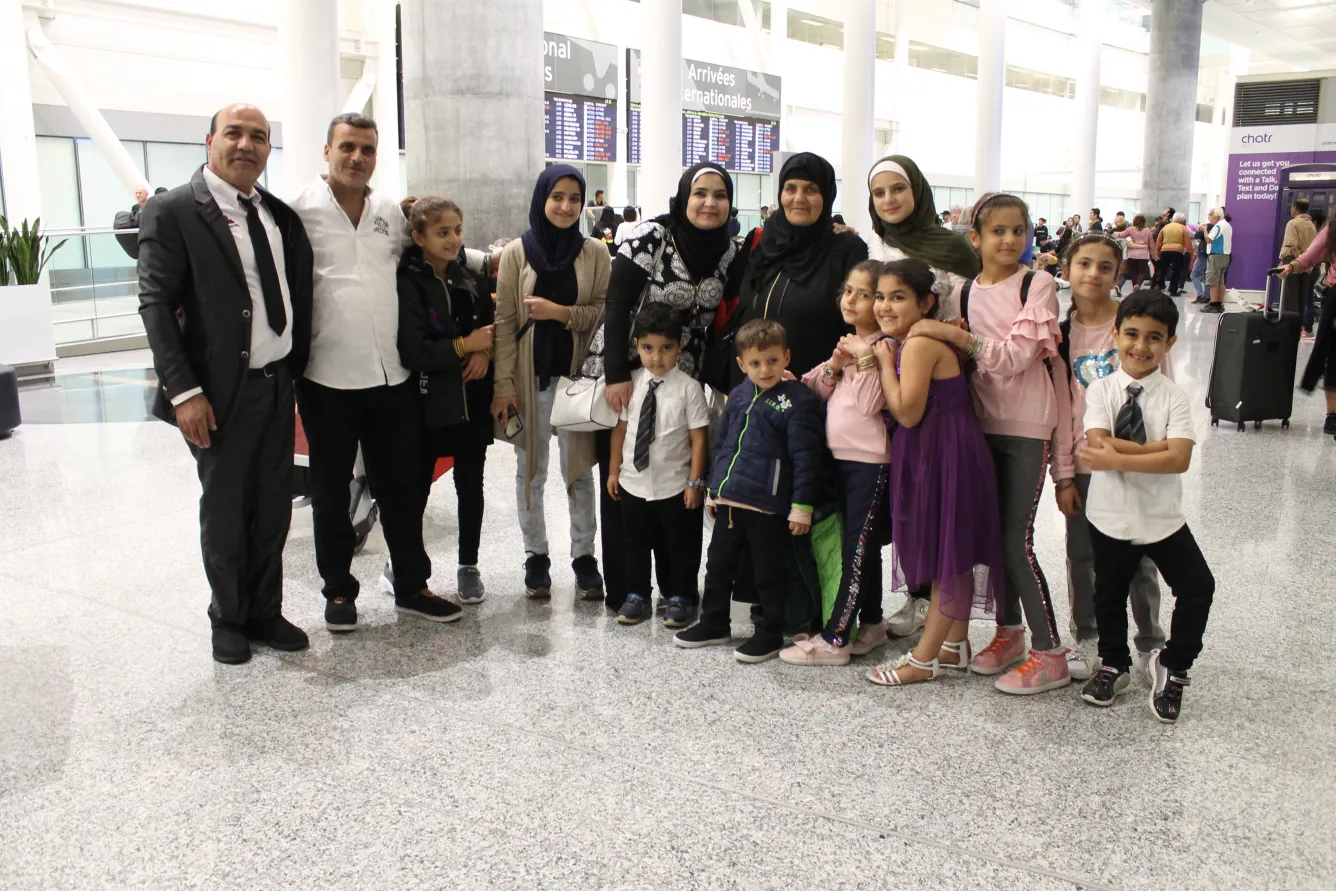Safa’s pink bed: One Refugee Girl’s Journey to Canada
Guest blog by Abedelmajeed El-Noaimi, Communications Specialist, UNICEF Jordan
My story with Safa began in 2014 in Za’atari refugee camp. I had been working there since it opened in 2012. In those days, thousands of refugees arrived daily, often in desperate conditions as they fled on foot across the border.
When I met Safa, she was six years old, learning in a UNICEF-supported school set up in a tent. She had lost her right leg in a bombing that also destroyed her home in Syria. The family barely escaped the attack on their home in Aleppo and fled to Damascus but there they experienced another bombing. Safa’s father begged doctors to save Safa’s leg but they insisted it needed amputation. Her dad felt he had no choice but to flee to Jordan to keep his family safe. He carried Safa in his arms over the border.
Sadly, at that time I had become used to hearing the many horrific stories coming from the war in Syria. Even so, Safa’s story hit me hard because she was so small and innocent. The violence of what had happened to her was shocking.
Most of the Syrian refugee families I meet tell me the same thing – they left their homes to save their children’s lives. Otherwise they would have never left.
In Za’atari refugee camp there was no threat on the children’s lives. However, it wasn’t an easy place to live in at that time. The camp was very congested – at its peak 128,000 refugees lived in five square kilometers. Living conditions were poor with families staying in tents. The hot, dusty summer days were almost more than a human could withstand.

Safa was one of many children struggling because of the hardship of life in the camp. Since she couldn’t walk, she had to be pushed in a wheelchair, making her dependent on her family to take her to school or the health centre. With their support, she did enroll in the UNICEF-supported school and child friendly space. This was a shining light at this difficult time, that thanks to UNICEF there was still hope for these children who had suffered so much.
But I did notice Safa was different. She didn’t enjoy playing like her siblings. Her disability meant that she was excluded from games with physical interaction. She didn’t like having her photograph taken. The only thing that worked was letting her take the camera and allowing her to become the photographer. This was the only way to make her smile and laugh. She was clearly carrying many emotional scars, but she still had an indomitable spirit and a self-confidence that would only grow stronger as she settled into life in the camp and school.
Through it all she also had the love of her father who was always there for her. He was often the only person who could make her smile.
Safa was growing more independent through many programs UNICEF and other organizations had in place for children with disabilities. Using crutches was the first step but it took a lot of training. Then she was given her first prosthetic leg.
Getting Safa to use the prostatic leg was very challenging. Her father had to encourage her through every session. I didn’t blame her. Most of her friends were outside playing games. It was a huge burden for a six-year-old girl to take on.

It was four years before I would see Safa again. The family had left the camp to try and live in the city but ended up in Azraq refugee camp, which was established to relieve congestion at Za’atari.
When I met Safa again, she didn’t recognize me, I had to show her photos of me holding her. I could see her psychological stress was still with her. She didn’t trust many people, she was withdrawn, and her parents had separated under all the pressures. Luckily, she was still attending school but Safa was still suffering from her injury. The prosthetic was no longer the right size for her growing frame. It was causing extreme discomfort even when walking short distances.
She didn’t want to talk much until I told her: “Pretend I’m a genie!” With her attention piqued, I said: imagine I can grant you three wishes, what would they be? She told me she wished she could have her own bed, that she would like a new prosthetic leg – one that fits, and that she wished they could live in Canada. When I asked her why Canada, she told me her aunt, who she talks to all the time, lives there and that it is a beautiful place.
When I told colleagues in the camp, they not only began health referrals for her prosthetic leg, but the youth volunteers jumped into action to make Safa a real bed in their workshop. They painted the frame pink, her favourite colour. She adored her new bed; I had never seen her smile more than the day it was delivered.
Not long after, I visited the family and heard the good news. Safa’s wish was coming true – her family were accepted in a sponsorship programme and would soon fly to their new home in Canada, where they would be reunited with her beloved aunt. It was an emotional day when they departed Amman, Safa was full of excitement. I really hoped that Canada would give them a chance to regain a normal childhood.

During the COVID-19 lockdown, I had the opportunity to video-chat with Safa. Immediately I noticed the change in her expression. She was so happy, so relaxed – and for the first time, her shyness was gone. She didn’t hold back her thoughts and chatted away happily. I am so thankful that she is enjoying a new home and lifestyle in Canada which was her wish. I’m also proud that, despite the difficulty of growing up in a camp, the schools and spaces that UNICEF and partners have built allowed children some sense of normalcy and fun. It means these children can still aim high and achieve their dreams. Until all children realize their rights – including and especially the right to be a child – our work won’t be done here in Jordan.
When I asked Safa if she has new wishes, she told me that she wishes for the COVID-19 crisis to pass, and to have a chance to go back to school. I was pleased to hear that because it was a wish for children all over the world. I hope to see this wish fulfilled very soon, and just like all her other wishes I have a feeling it will.
